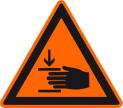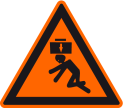Safety information for ferrite magnets
Our Ferrite magnets do not nearly have the same strengths as our Neodymium magnets. Nevertheless, we urge you to read the following safety information carefully before handling ferrite magnets. Also share this information with employees, customers and other people who come into contact with ferrite magnets.
PDF versionFor the handling of neodymium magnets, please refer to our safety information for neodymium magnets

Danger
Swallowing
Children could swallow small magnets.If several magnets are swallowed, they could get stuck in the intestine and cause perilous complications. Magnets are not toys! Make sure that children don't play with magnets.

Warning
Contusions
Big magnets have a very strong attractive force.Unsafe handling could cause jamming of fingers or skin in between magnets. This may lead to contusions and bruises. Wear heavy protective gloves when handling larger magnets.

Warning
Pacemaker
Magnets could affect the functioning of pacemakers and implanted heart defibrillators.- A pacemaker could switch into test mode and cause illness.
- A heart defibrillator may stop working.
- If you wear these devices keep sufficient distance to magnets.
- Warn others who wear these devices from getting too close to magnets.

Warning
Heavy objects
Too heavy loads, symptoms of fatigue as well as material defect could cause a magnet or magnetic hook to loosen from the surface that is was attached to.Falling objects could lead to serious injuries.
- The indicated adhesive force applies only to ideal conditions. Allow for a high safety cushion.
- Don't use magnets in places where people could sustain injuries in case of material failure.

Caution
Magnetic field
Magnets produce a far-reaching, strong magnetic field. They could damage TVs and laptops, computer hard drives, credit and ATM cards, data storage media, mechanical watches, hearing aids and speakers.- Keep magnets away from devices and objects that could be damaged by strong magnetic fields.
- Please refer to our table of recommended distances.

Caution
Airfreight
Magnetic fields of improperly packaged magnets could influence airplane navigation devices.In the worst case it could lead to an accident.
- Airfreight magnets only in packaging with sufficient magnetic shielding.
- Please refer to the respective regulations.

Caution
Postage
Magnetic fields of improperly packaged magnets could cause disturbances in sorting machines and damage fragile goods in other packages.- Please refer to our shipping tips.
- Use a large box and place the magnet in the middle surrounded by lots of padding material.
- Arrange magnets in a package in a way that the magnetic fields neutralise each other.
- If necessary, use sheet iron to shield the magnetic field.
- There are stricter rules for airfreight: Refer to the warning notice "Airfreight".

Notice
Demagnetisation through neodymium magnets
Stronger neodymium magnets can cause a change of magnetisation direction or demagnetisation in ferrite magnets.Store ferrite magnets at least 5 cm away from neodymium magnets and do not mix those types of magnets.

Notice
Temperature resistance
Ferrite magnets can be used at temperatures between -40°C and 250°C.At lower and higher temperatures they lose part of their adhesive force permanently. Don't use ferrite magnets in places where they are exposed to temperatures below -40°C or above 250°C.

Notice
Mechanical treatment
Ferrite magnets are brittle.When drilling or sawing a magnet with improper tools, the magnet may break. Stay away from mechanical treatment of magnets if you do not possess the necessary equipment and experience.

Notice
Influence on people
According to the current level of knowledge, magnetic fields of permanent magnets do not have a measurable positive or negative influence on people. It is unlikely that permanent magnets constitute a health risk, but it cannot be ruled out entirely.- For your own safety, avoid constant contact with magnets.
- Store large magnets at least one metre away from your body.